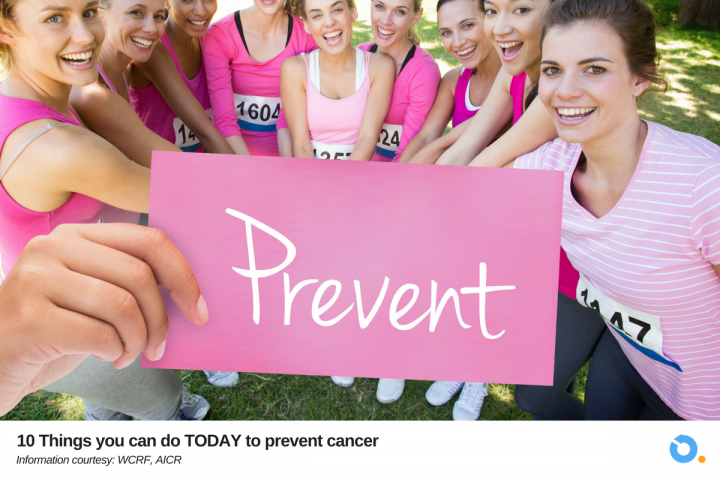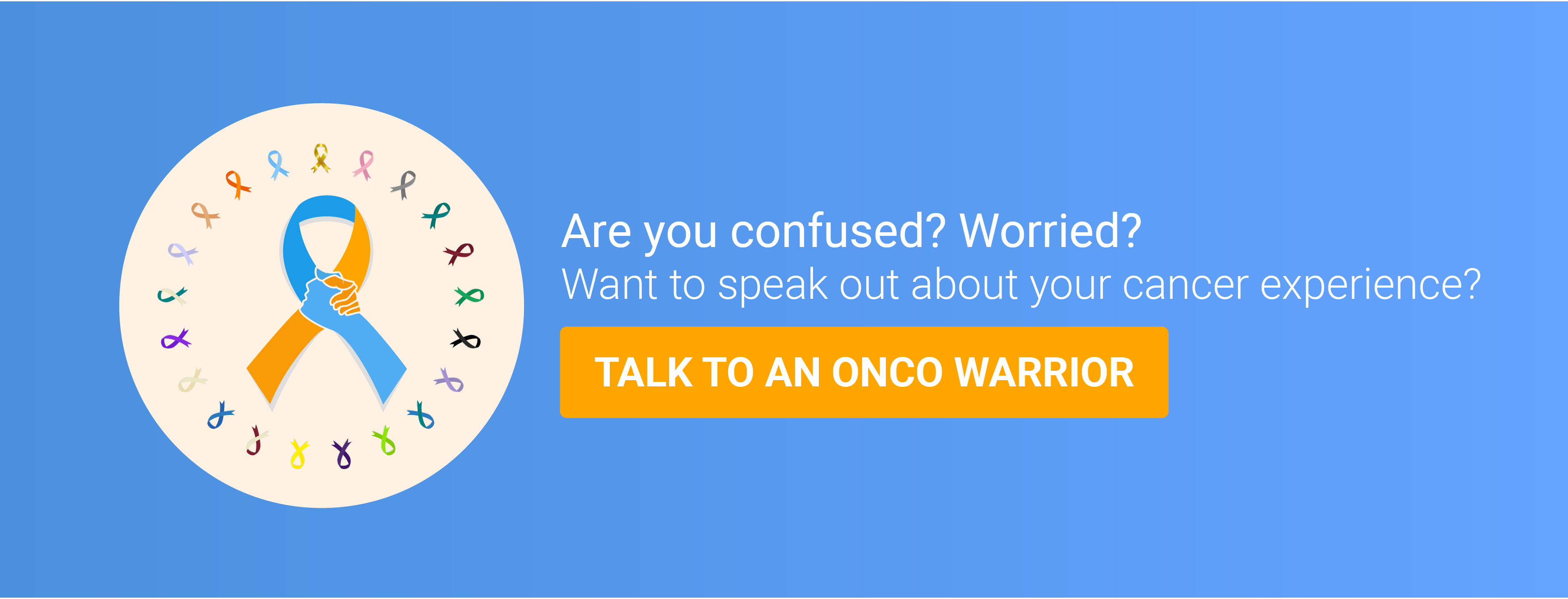Prevention is better than cure, and for a disease as serious as cancer, we need to do everything it takes to reduce our risk.
 Onco.com presents the top 10 corrective actions that you can apply to your lifestyle today, in order to prevent cancer effectively. These guidelines have been developed and released by the American Institute of Cancer Research[1] in their latest cancer risk-analysis report.
Onco.com presents the top 10 corrective actions that you can apply to your lifestyle today, in order to prevent cancer effectively. These guidelines have been developed and released by the American Institute of Cancer Research[1] in their latest cancer risk-analysis report.
1. Maintain a healthy weight
The AICR has concluded that obesity is the cause of at least 12 types of cancer, including ovarian, prostate (advanced), stomach (cardia), oropharyngeal, colorectal, breast (postmenopausal), gallbladder, kidney, esophageal adenocarcinoma, pancreatic, and endometrial cancer.
Higher the body fat percentage, higher the risk of cancer. Body fat acts like a ‘hormone pump’. It releases insulin, estrogen and other hormones into the bloodstream, which promotes cancer growth.
Aim to stay at the lower end of the healthy Body Mass Index (BMI) range, according to your height and build. Go for regular BMI screenings and aim to control your dietary intake/increase exercise accordingly, to maintain a healthy BMI.
2. Be physically active
It is a no-brainer that staying active has many benefits including keeping your weight under check and reducing mental stress. But these new guidelines stress on the importance of physical fitness to prevent cancer. Studies show that regular physical activities can help in keeping hormone levels at check, which is important – because hormonal imbalances can increase your cancer risk.
Integrate more physical activities into your daily routine – such as brisk walking, or cycling. For maximum health benefits, researchers recommend that we aim for 150 minutes of moderate, or 75 minutes of vigorous, physical activity a week. So the next time you see a “Use Stairs, Stay Fit” placard in front of an escalator, you know what to choose, and why!
3. Eat whole grains, vegetables, fruits, and beans

Dietary intake is an important part of cancer prevention. As seen earlier in this article on the Onco.com newsroom, the benefits of consuming healthy nutrients in balanced proportions, are multifold.
The AICR report places special emphasis on plant foods (such as vegetables, fruits, whole grains and beans), which contain fiber and other nutrients. In addition to vitamins and minerals, plant foods contain phytochemicals – which are biologically active compounds that help to protect body cells from the kind of damage that leads to cancer. Plant foods can also help us to maintain a healthy weight because many of them are lower in energy density (number of calories).
For each meal, at least two-thirds of your plate should be filled with vegetables, fruits, whole grains and beans. In fact, if you go by the latest AICR recommendation, you should base all of your meals on plant foods.
4. Avoid fast food
The report urges people to stop consuming processed foods that are high on fat, starch or sugar content. Limiting such foods will help in controlling one’s calorie intake, and in maintaining a healthy weight. There is strong evidence that consuming fast foods will lead to weight gain and obesity, which are linked to 12 types of cancers. Additionally, glycemic load (caused through fast foods) also increases the risk of developing endometrial cancer.
Stay away from high-fat, high-sugar fast foods, and aim to snack on whole foods, such as nuts, greek yogurt and granola. Stack up your shelves with apples instead of candy bars, and feel the difference in your metabolism!
5.Avoid red meat and processed meat
The 2018 report stresses on the direct links between the consumption of red meat (such as beef, pork or lamb) and the increased risk of colorectal cancer. The AICR panel has also recommended that people stay away from processed meats (such as ham, bacon, salami, hot dogs and sausages) as much as possible.
Avoid eating red meat, cold cuts, ready-to-eat meat packs, and other processed meat variants. Switch to organically grown lean meats such as chicken (ideal portions: chicken breast) and seafood (basa fillets, prawns, etc) for animal protein requirements. Alternatively – consume lentils, soyabean and natural whey for your protein intake requirements.
6. Avoid sugar-sweetened drinks
On the subject of beverages, the report insists that water is the safest (duh!), followed by unsweetened beverages as a close second. There is strong evidence linking sugar-sweetened beverages to weight gain, overweight and obesity, which in turn is responsible for upto 12 types of cancers. Sugar-sweetened beverages may fill the body with energy (calories), but they do not influence appetite in the same way as food does, and are likely to promote overeating as a result of an inflated glycemic index (GI).
Switch your beverage consumption habits to include a lot of water, tender coconut water, fresh fruit juices and skimmed-dairy smoothies. Avoid the usage of refined sugar in your regular dietary habits. If you cannot avoid sugar completely, switch to a natural sweetener, such as Stevia.
7. Avoid alcohol
When it comes to cancer, the AICC insists that avoiding alcohol completely is the best way to go, and under any circumstance, alcohol consumption should be limited at the very least. Previous research has shown that modest amounts of alcohol may have a protective effect against coronary heart disease, but for cancer prevention, the evidence is clear and convincing: alcohol in any form is a potent carcinogen. It is linked to 6 different types of cancers.
If you are concerned about cancer, the best way to go is to not consume alcohol at all. However, if you prefer drinking socially, the AICR guidelines suggest that you cap your consumption to two drink a day at maximum (for males) and one drink a day (for females).
8. Stay away from ‘cancer prevention’ supplements
It is essential that people consume the necessary nutrients from a healthy diet, and not through an overdose of ‘cancer-prevention’ supplements that are available in the market today.
The panel does not discourage the use of multivitamins or situation-specific supplements, but warns against consuming pills that contain high-dose beta-carotene, as they can promote cancer instead of reducing the risk.
Don’t buy or consume pills that claim to lower your cancer risk. Most of these products are likely to be fraudulent. If you see a friend or loved one investing in such products, warn them against the possible side effects and encourage them to switch to a healthier diet.
9. Breast-feed newborn babies
The last two recommendations are directed at specific sub-groups[2]. Guideline number 9 indicates that all new mothers should breastfeed their children.
The report also explains why it is beneficial to both mother and child, and useful in preventing cancer. First, breastfeeding lowers the levels of some specific cancer-related hormones in the mother’s body. Second, at the end of the breastfeeding period, the body gets rid of any cells in the breast that may contain DNA damage. Also, babies who are breastfed are less likely to become overweight and obese. Overweight and obese children tend to remain overweight through their adolescence and adulthood.
All new mothers should breastfeed their babies for the minimum recommended period. Scientists have recognized the benefits of breastfeeding in fighting breast cancer for a long time.
10. Get expert, personalized advice after a confirmed cancer diagnosis
The last recommendation in the report is one that the Onco.com team strongly resonates with. A cancer diagnosis is an extremely serious matter, and if a medical professional confirms the presence of cancer, it is important for the patient and their family to consult the right specialists to establish the right nutritional recommendations, the right lifestyle habits and the right treatment plan.
The AICR has its own set of guidelines for cancer patients, and for each cancer patient, the required treatment format may be different. It is therefor, critical for patients to receive personalized treatment planning, so that they can have the best possible treatment outcomes.
If you or a loved one has recently been diagnosed with cancer, get the right treatment advice from a multidisciplinary team of experienced oncologists.
Some interesting facts about this report
- This is the third edition of the report (The report gets published once a decade; the first two reports were published in 1997 and 2007, respectively)
- It is based on data collected over 30 years, from 51 million people, 3.5 million cancer cases and 17 cancer sites
- It has been co-produced by AICR and the World Cancer Research Fund (WCRF)
“The recommendations are practical and achievable steps that everyone can take to reduce their risk of cancer, and while any small steps that people can take will help, the recommendations are intended as an overall lifestyle package.” – Dr Nigel Brockton, PhD, director of research at the American Institute for Cancer Research (AICR)
Note: The information in the article was first seen on Medscape[2:1]. The recommendations from the original study have been summarized into ten easy points, or ‘guidelines’. Together, they form a blueprint for the prevention of cancer in general.
- AICC.org – http://www.aicr.org/reduce-your-cancer-risk/recommendations-for-cancer-prevention/ ↩︎
- Medscape – https://www.medscape.com/viewarticle/897097#vp_2 ↩︎ ↩︎


